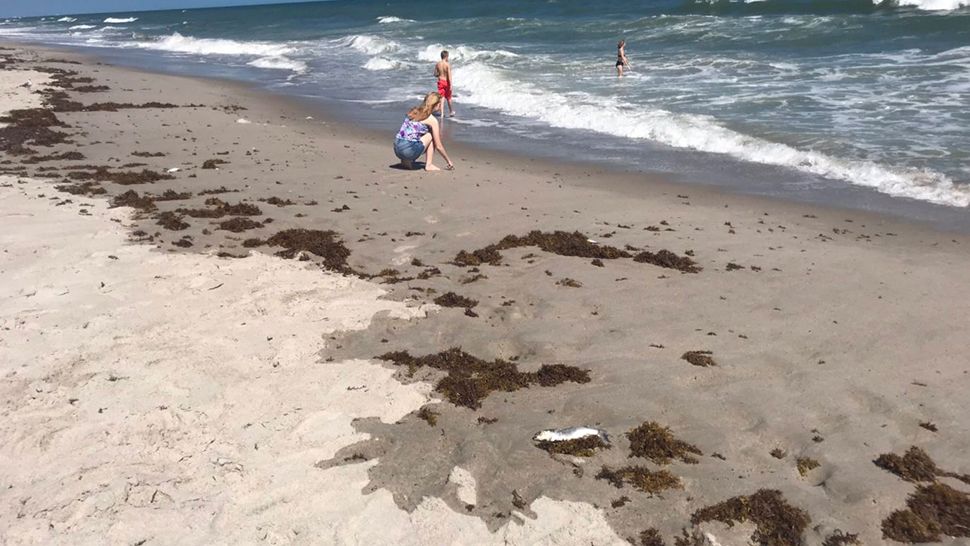MELBOURNE, Florida — Florida red tide, which has so far damaged ecosystems and harmed marine life along the Gulf Coast, has spread to Brevard County.
- Florida red tide confirmed at some Brevard beaches
- Some are complaining of coughing, nasal suffering
- People with respiratory conditions to stay away from beach
- RELATED:
- SEE BELOW: Map of how red tide has spread around Florida▼
Preliminary test results that came back Wednesday confirmed the presence of the algae at several Brevard beaches. Satellite Beach is seeing higher levels than anywhere else, and many people there were coughing and complaining.
"My nose, mouth and throat has been acting up," said Maria Gladue, a beachgoer visiting from Connecticut.
Beachgoers were complaining, and lifeguards are wearing face protection.
From Satellite Beach to Melbourne, dead fish have been found lying on the sand.
"The water seems pretty nice, but like I said, you're breathing in the air. You just get that urge to constantly cough. I guess that could be a symptom of that," Gladue said.
The county worked with the Florida Fish and Wildlife Conservation Commission to establish the six locations they would test, from Melbourne to Cocoa.
The test results confirmed the presence of Karenia brevis at 1.35 million cells per liter at Pelican Beach Park and lower levels in Melbourne Beach.
Medium levels of K. brevis were found at Seventh Avenue and Wave Crest Avenue beach approach in Indialantic, and in Melbourne Beach at Spessard Holland South and Coconut Point Park.
"We are definitely monitoring to see what's going on, if it causes effect of losing business," said Jojo Holstein, Coconuts on the Beach assistant general manager.
Back on the beach, visitors just want it to go away.
"I hope they can find out what the issue is and correct it so people can enjoy their vacations," Gladue said.
"(It’s) irritating to the throat, nose, and the eyes," said Skyler Baker of Island Watercraft Rentals, who is out on the sand all day long, renting out chairs, umbrellas, and kayaks.
He had to don a mask to keep from coughing, as are lifeguards watching over the beach.
"Definitely had some kids sniffling, adults coughing," Baker told Spectrum News.
Patrons like Luann Beissel, who is visiting from Michigan, immediately noticed something when she stepped out of the car.
"… I saw the kid who rented the chairs to us had a mask on, and I thought, ‘is it dangerous for us to be breathing this?’" Beissel said.
Spreading Awareness in Brevard
The Florida Department of Health is urging people with severe or chronic respiratory conditions to keep their distance for now.
Three hundred signs have been ordered and are being put up at lifeguard stations, hotels and anywhere where the naturally occurring algae is impacting — places where people are most feeling its effects.
Officials with the Space Coast Office of Tourism and Ocean Rescue are putting up the warning signs along the coast.
Beachside schools are monitoring the situation when it comes to allowing students outside during the day and any possible impact on sporting events.
Although there were no plans to close the beach or campgrounds at Jetty Park as of Thursday, Port Canaveral said it was allowing guests to cancel or reschedule reservations without a fee.
A group of scientists met with members of Florida’s congressional delegation to discuss the impact on the coastline.
The toxic algae bloom has spread to more than a dozen counties, causing millions of dollars in cleanup and lost tourism. This year's bloom in the Gulf has been particularly devastating.
Scientists say warming seas and pollution caused it to spread. One scientist is calling for closer monitoring of red tide.
"We can't stop the red tide. But we can make predictions so that people at risk, people with asthma, coastal communities can make plans," said Dr. Jacqueline Dixon, a dean at the College Of Marine Science at the University of South Florida.
U.S. Sen. Bill Nelson and representatives Kathy Castor and Charlie Crist attended the meeting in Pinellas County.
Concerns in Volusia County
With tests confirming red tide has reached the waters off the coast of Brevard County, people are worried it could spread north into Volusia County beaches. Volusia County Beach Safety officials say there’s no evidence that has happened yet.
Every evening, Aline Lawrenson enjoys her walk on the beach. She says she loves the usually refreshing sea breeze.
“It’s good exercise, it keeps you strong,” said Lawrenson. “I enjoy this fresh air we have in the ocean.”
But Lawrenson worries with red tide creeping further up the Atlantic coastline, that could change.
“I hope the tide doesn’t come here,” she said.
Red tide is typically found in the Gulf of Mexico, but Spectrum News 13 weather experts say this year ocean currents have carried it to the Atlantic coast.
“The gulf stream picks up particles of the red tide and lifts in northward,” said Spectrum News 13 Meteorologist David Heckard. “Unfortunately in the last week, those particles have pushed their way into parts of Brevard and St. Lucie Counties."
There’s no indication at this point red tide will reach Volusia County beaches, but Volusia County Beach Safety officials say they’re continuing to closely monitor the situation.
You can find more information on red tide from the Florida Department of Health and Florida and Florida Fish and Wildlife Conservation Commission.
This is a Florida Fish and Wildlife Conservation Commission map of how Red Tide has spread around the Sunshine State.
Reporters Greg Pallone and Jeff Allen contributed to this story.




